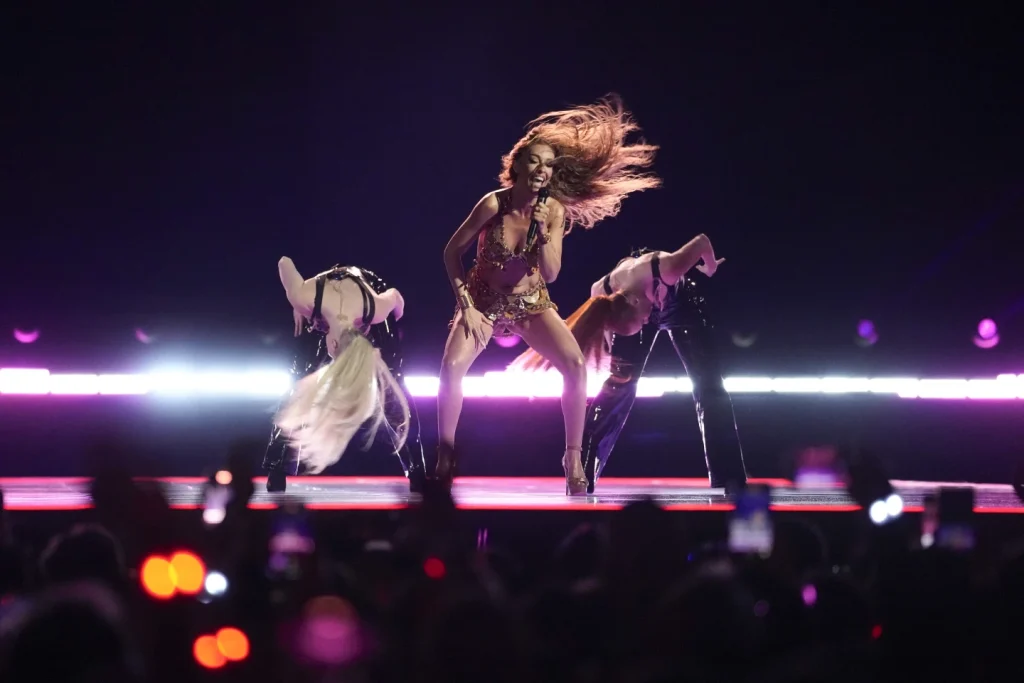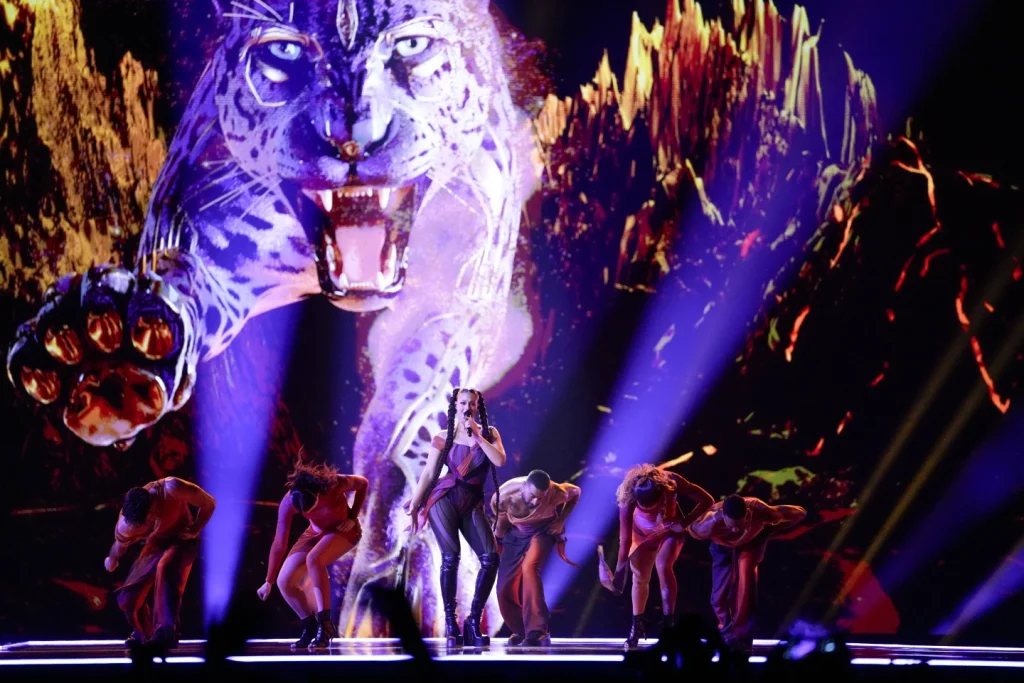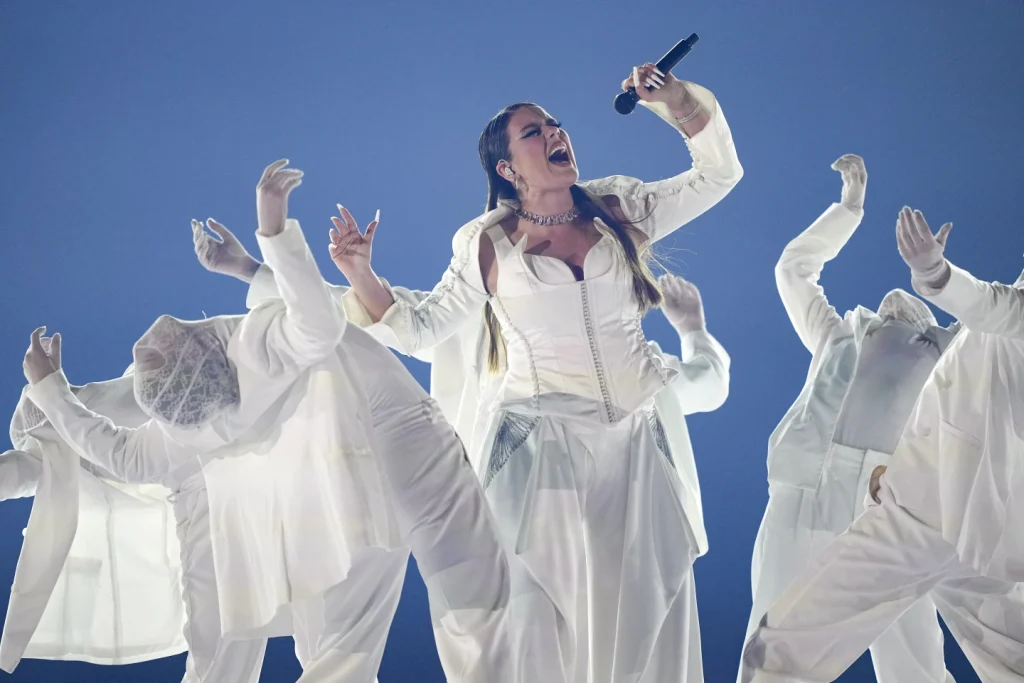The 68th Eurovision Song Contest, commencing in Malmo, Sweden, has set the stage for a dazzling display of musical talent from across Europe and beyond.
Amidst the glitz and glamour of the competition, the somber shadow of the ongoing war in Gaza looms large, adding a layer of complexity to the festivities.
The first of the two semifinals held in Malmo witnessed performers from 37 nations vying for a coveted spot in the final showdown on Saturday.
The eclectic mix of acts showcased a diverse range of musical styles, from the infectious electro beats of Croatian singer-songwriter Baby Lasagna to the anthemic ballad “Teresa & Maria” by the Ukrainian duo alyona alyona and Jerry Heil, symbolizing their war-torn nation’s resilience.
The competition saw a mix of seasoned favorites and fresh talents making their mark on the Eurovision stage.
Notable mentions include goth-style Irish singer Bambie Thug, Finnish prankster Windows95man, and Portuguese crooner Iolanda, who captivated audiences with their unique performances.
However, the journey to the final was not without its share of eliminations, with countries like Iceland, Azerbaijan, Poland, Moldova, and Australia bowing out of the race.
Looking ahead to the second semifinal, anticipation runs high for acts such as nonbinary Swiss singer Nemo, Italian TikTok star Angelina Mango, and the Netherlands’ Joost Klein, each bringing their own brand of musical artistry to the competition.
The stage is set for a thrilling showcase of talent, as performers gear up to compete for the coveted title of Eurovision champion.
Against the backdrop of the music and merriment, the specter of political tensions casts a shadow over the event. With security tightened in Malmo in anticipation of both Eurovision fans and pro-Palestinian protesters descending on the city, the atmosphere is charged with a mix of celebration and activism.
The presence of Israel as a participant in the contest adds a layer of complexity, with demonstrations planned to protest the Israel-Hamas conflict that has claimed thousands of lives.
Amidst the buzz of the competition, the power of music to transcend borders and unite people from diverse backgrounds is evident.
As performers take to the stage to share their artistry with the world, the Eurovision Song Contest stands as a testament to the universal language of music and its ability to bring people together, even in the face of adversity.
The Eurovision Song Contest, a beloved annual event that brings together countries from across Europe and beyond, has once again found itself at the center of political controversy.
The recent comments made by Jean Philip De Tender, deputy director-general of the European Broadcasting Union, regarding the potential banning of Israel from the competition have sparked debate and raised questions about the intersection of music, politics, and unity.
De Tender’s assertion that banning Israel would be a political decision that the Eurovision organizers cannot take highlights the delicate balance that the contest must strike in order to remain true to its motto of “United by Music.”

While the Eurovision Song Contest is meant to be a celebration of music and cultural exchange, it is impossible to divorce it entirely from the political realities that exist in the world today.
The heightened security measures being implemented for Eurovision week in Sweden, including the deployment of police from neighboring countries, serve as a stark reminder of the ongoing threat of terrorism that looms over large-scale events such as this.
The decision to ban flags and signs, with the exception of national flags and the rainbow pride flag, reflects the organizers’ desire to create a safe and inclusive environment for all participants and attendees.
However, the decision to prohibit Palestinian flags from being displayed inside the contest venue has sparked controversy and drawn attention to the political tensions that continue to divide nations and communities.
Performers, such as Germany’s contestant Isaak, have found themselves caught in the crossfire of social media campaigns urging them to boycott the event in protest of Israel’s policies in Gaza.
Isaak’s refusal to bow to this pressure underscores the complex and often fraught nature of the Eurovision Song Contest as a platform for both music and politics.
The experiences of singer Manizha Sangin, who represented Russia at the contest in 2021 before being expelled the following year due to her outspoken opposition to the country’s invasion of Ukraine, serve as a poignant reminder of the personal and professional consequences that can result from taking a stand on political issues.
Despite facing backlash and censorship in her home country, Manizha remains committed to using her music as a message of hope and inspiration.
As Manizha aptly notes, music has the power to inspire and unite people in ways that transcend political divisions and national boundaries.
The Eurovision Song Contest, with its diverse array of performers and styles, has the potential to bring people together and foster understanding and empathy.
However, as long as political tensions and conflicts persist, the contest will continue to be a battleground for competing narratives and agendas.

In conclusion, the Eurovision Song Contest remains a powerful and influential platform for showcasing the talents and diversity of the participating countries.
While efforts to keep politics out of the competition are commendable, it is clear that the contest cannot exist in a vacuum and must navigate the complex terrain of international relations and societal issues.
As performers and audiences come together to celebrate music and creativity, it is important to remember the potential of music to bridge divides and foster connections that transcend politics.
Only through dialogue, understanding, and a commitment to unity can the Eurovision Song Contest truly fulfill its motto of being “United by Music.”
